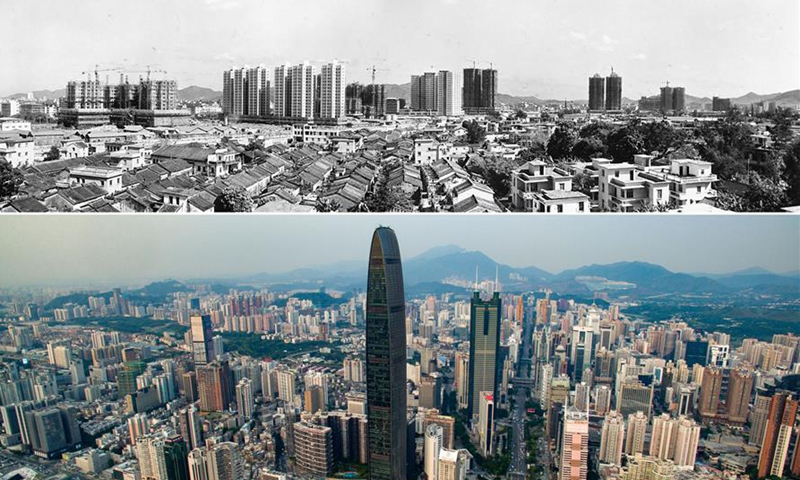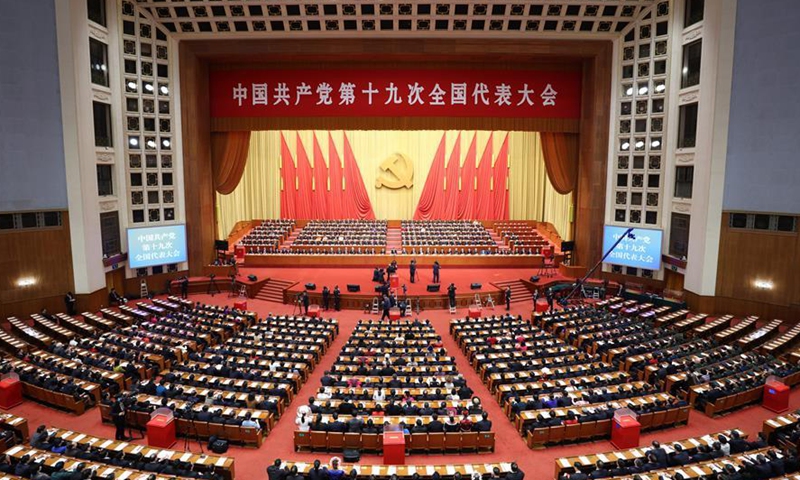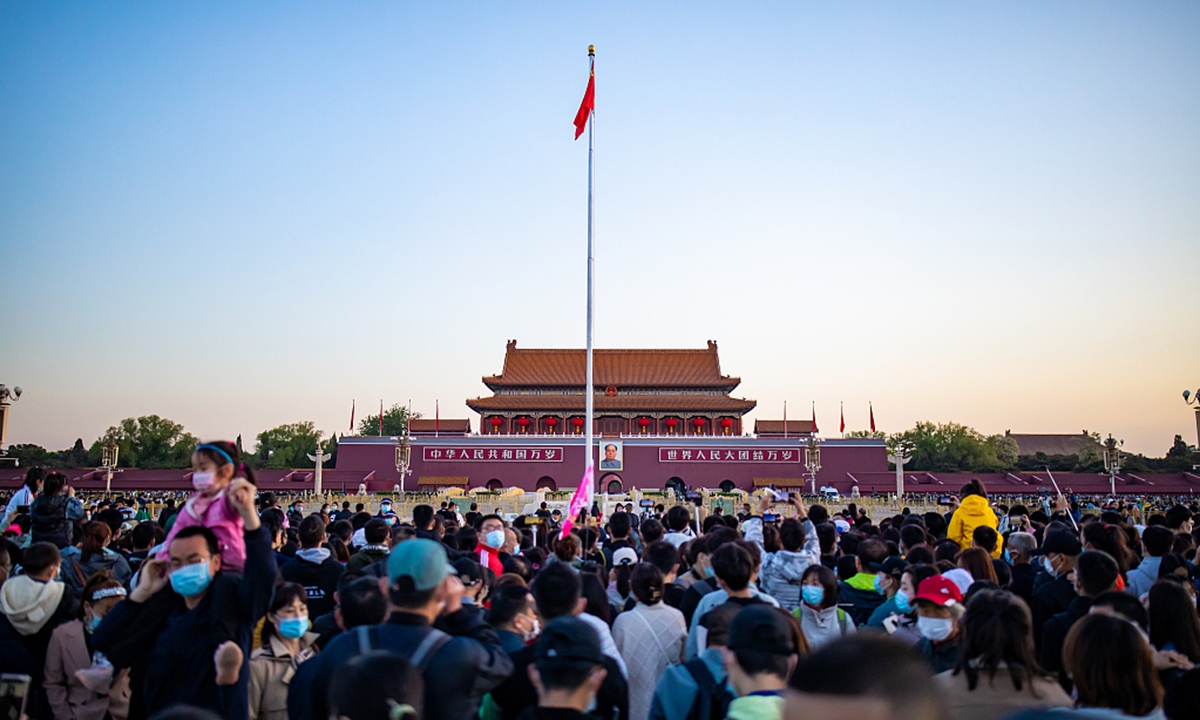With the 100th anniversary of the founding of the Communist Party of China (CPC) less than a month away, the Global Times will publish a series of reports to decode why the CPC is the destined choice for the Chinese people, why it can rise above challenges and tests in a century, and what is its secret code to success in governing such a vast country and implementing effective economic policies that have created an economic miracle for China and the world.
The current series is divided into two parts to explore how the CPC withstood storm after storm and overcame crisis after crisis, and how firm leadership has been the key to the CPC's success.
This is the second part of the current series. It will focus on how the CPC rose from a dark period in the late 1980s, when the global environment was clouded by drastic changes in the Soviet Union and Eastern Europe, and a trend of Western ideologies was brewing domestically, and found China's own steadfast and confident path in a new era of development.
After the self-correction in the late 1970s to heal the country from the damage of the Cultural Revolution (1966-76), the CPC kicked off reforms and opening-up in 1978. China achieved an enormous economic and social progress and enhanced connections and interactions with the world in all aspects, but in the late 1980s, another "darkest hour" arrived due to the impact of Western liberalist thought and some problems such as corruption from inside the Party with the ongoing reforms and opening-up.
From the late 1980s to early 1990s, not only China, but the whole socialist bloc including the Soviet Union and many Eastern and Central European countries encountered a huge wave of "liberalization" or "democratization," which in fact was Westernization.
Again, China was at the crossroads of history. The CPC leaders, just like their comrades in Europe, were facing a decision — to insist on the path of socialism with Chinese characteristics and keep the Party's original aspiration; or give up socialism like what the European comrades did and embrace Westernization.

Because of the Cultural Revolution, China's development fell behind most other countries of the world. When some Chinese people, officials and intellectuals, engaged with the world and saw the advancement and prosperity of the West through travelling abroad, listening to VOA news, watching Hollywood movies and drinking Coca Cola, they felt shocked, and lost the confidence to keep going on the path of socialism, said some analysts.
"At that time, we believed a complete Westernization, just like what Japan and South Korea did, or maybe just like our Taiwan and Hong Kong regions, will help China solve all problems and catch up with other major powers of the world soon," said a Beijing resident who was a student in 1989.
When we saw the gap between the West and our country, we were truly jealous and desperately wanted the change, and we naively believed that there was a "panacea", a medicine that can cure all illnesses for China - "democratization," he said, adding that not only young students, but also a few senior officials of the CPC leadership thought similarly.
In the late 1980s, some Chinese people, especially intellectuals and students, who desperately wanted the country to be opened and felt extremely unconfident in the front of mighty Western modern culture and neo-liberalism ideology, started to undermine traditional Chinese culture and crow about the advancement of Western culture.
The documentary "River Elegy" in 1988 is a typical example, as it immaturely concluded that China's land-based civilization was inferior to Western maritime culture, and the documentary also tried to undermine patriotism and splendid traditions of the Chinese nation, which angered many Chinese people but also confused the minds of quite a number of the youths at that time.
Jin Canrong, a professor from Renmin University of China, said at that time, those people who preferred to blame Chinese traditional culture and expand the sense of inferiority were truly naive and immature.
"It's just like a grandson, when he can't do his job, he blames his grandfather. The Chinese culture is definitely not inferior to any other culture, the reason why the West has advantages over China in the past 100 years is because of industrialization," Jin said.
Once China realized full industrialization, "the West had no advantage at all because China's scale is way bigger than them all. That's why Western strategists and elites are worried and concerned about our development now," Jin noted.
"Luckily, the CPC didn't make the mistake, otherwise we might have collapsed like the Soviet Union," said the anonymous Beijing resident.
If the CPC made the mistake and compromised, China might have had civil wars as well, just like the Chechen War in Russia, or might have been attacked by the West, like what NATO did to former Yugoslavia in the 1990s, or China's state-owned properties and resources might have been privatized, and Western capitalists would have plundered the prosperity of our people like what the West did to Eastern and Central European countries after the Cold War," he said.

But how could the CPC leaders with Deng Xiaoping at the core at that time have known that it was right to insist upon socialism with Chinese characteristics while most socialist countries in Europe had chosen to give up on socialism?
Because their experiences had told them that complete Westernization wouldn't work, at least not for China, Chinese experts said, adding that Chinese intellectuals, pioneers in politics, and founding fathers of the CPC and the KMT had grand debates, competitions and struggles before choosing the path for China's modernization, and eventually it was concluded that the CPC was the answer. At the crossroads of history in the late 1980s, the CPC leaders had the confidence and determination to stay with their original aspiration.
Zhang Weiwei, director of the China Institute of Fudan University in Shanghai, said that "in fact, this was not the first time that China faced the choice of Westernization. From the late Qing Dynasty to the era of the Republic of China, the pioneers and pathfinders of the Chinese nation had tried almost all kinds of Western political systems."
"Constitutional monarchies, multi-party-systems, democratic elections…we tried them all, but none of them helped China to protect itself from invasions launched by Western colonialist or imperialist countries, and these attempts even caused further splits within China and endless wars between warlords across the country," Zhang said.
Finally, in 1949, the CPC brought a system that could help China to realize unification, independence and stability, and also give China the ability to defeat foreign invasions and regain its confidence, so that the whole nation can focus on development, Zhang said, noting that "the CPC and the socialist system are the destined choice of history, and the choice of the Chinese people."
However, not every communist party is qualified to be the choice of the people. The Soviet Union was also trying to push reform, as Mikhail Gorbachev, then leader of Soviet Union, proposed "new political thinking" to kick off his reform.
Some people in China at that time also believed the so-called "new thinking" was more correct than the CPC's opening-up and reform because it looked more Westernized. But later the facts proved that Gorbachev failed and Deng was right. Some experts said Gorbachev's reform was like a "political suicide" for the Soviet Union, and it was just like a gift for the West since the red giant just killed itself and quit the Cold War, then the West declared victory at almost no cost.
The socialist countries worldwide are facing unprecedented ideological threat from the West, and many forces are trying to use the trend to bury red regimes once and for all. The incident that occurred between spring and summer in 1989 was used and hijacked by some foreign forces and domestic extremists, and later escalated into riots. The CPC later made decisive moves to stop the turmoil, end the riot and stabilize domestic situation to restore stability and peace.
Successful development and mature governance of China today is just like the answer - the CPC made the right decision then. Compared with the unfortunate experiences of Russia after the Cold War and the poor destinies of other former socialist countries in Europe who chose other paths in 1989, the Chinese people understand that the CPC made a decisive decision in 1989 that saved the country and its reforms and opening-up. China eventually withstood a looming color revolution.
After the collapse of the Soviet Union, Yegor Ligachyov, former member of the political bureau of the Communist Party of the Soviet Union, once said "why has our reform caused a super power of the world to collapse, millions of people to suffer from poverty, and thrown Russia into the capitalist camp? While China's reform can bring the country to the path of construction, progress and improving people's living standard, and eventually turn China into a major power of the world?" The first and the most important reason is the leadership of the CPC, he said.
Li Yuejun, a former research fellow from the Institute of Party History and Literature of the CPC Central Committee, told the Global Times that apart from taking decisive action to end the political turmoil, the CPC also showed its capability of learning, reform and governance.
On one hand, the Party used all resources to ensure the fundamental political system of the country was unshakeable and safeguarded the stability of the country to create an ideal environment for reform and development; on the other hand, it learned all kinds of advanced experiences around the globe to improve itself not only in economy, science and technology, but also in governance. Otherwise the Party wouldn't be able to deliver what the Chinese people need after it decisively ended the turbulence, experts said.

In summary of those cases in the history, the keys for the CPC to overcome serious challenges and go through the "darkest hours" in the past are the insistence on independence and autonomy; insisting on the methodology of seeking truth from facts, and sticking to a leadership with a strong core that could remain true to the CPC's original aspiration and keep the founding mission in mind, said analysts.
Xi Jinping, general secretary of the CPC Central Committee, in January 2020 called for continued efforts to ensure that the whole Party remains true to its original aspiration and keeps its mission firmly in mind.
In explanation of the CPC's original aspiration and founding mission, Xi said "All the hard work, struggles and sacrifices the Party has made since its founding are for the happiness of the Chinese people and the rejuvenation of the Chinese nation."
Xi also warned that "when we get closer to the national rejuvenation, it won't be plain sailing; there will be more risks and challenges, and even terrifying waves."
Some analysts predicted that the "waves" could be the challenges launched by foreign forces as China's national rejuvenation will inevitably impact or threaten their existing hegemony, whether China has intentions or not, so the US will not just sit and watch China surpass it.
In order to realize the historic goal of national rejuvenation by the middle of the century, the CPC and China will encounter more difficulties and challenges in the future as the world is experiencing a profound change which has never been seen in the past century, and in this period, a stable and powerful leadership with a strong core for the Party is fundamental for the CPC to lead the country to realize this grand historic goal, experts said.
China has seen many problems with fast economic development in the past decades since the reform and opening-up, such as corruption, uneven development between the eastern and western regions, and the reemerging ideological threat from the West that could once again challenge the country's fundamental political system.
Since the 18th National Congress of the CPC, the Party under the new generation of leadership with Xi at the core has launched an unprecedented campaign against corruption, and received remarkable outcomes. The Party's construction has also been strengthened, and these changes have ensured China will realize goals one by one such as the victory of the campaign against poverty and the goal to complete the building of a moderately prosperous society in all respects.
At present, China is the second largest economy in the world, and it's just a matter of time before it surpasses the US in the near future, and China also has many world leading unique advantages such as 5G technology, high-speed railway systems and the capability in construction of infrastructure.
During the COVID-19 pandemic, China's governance and political system have also shown better performance than the Western system. From national leaders to ordinary people, from elites to grassroots, China is now becoming much more united and confident than in the late 1980s, while the West is getting more and more insecure, worried, polarized and divided.
In the trade war launched by the US during the Trump administration, China has never compromised and launched tit-for-tat retaliations, and it proved that Chinese economic development received no major damage while the US is suffering from its wrong strategy.
In the fight against foreign forces' interference in Hong Kong, the CPC has also made calm and decisive actions in diplomacy, politics and legislature to successfully restore peace and stability to the city. On the Taiwan question, under the leadership of the CPC, the Chinese mainland has also strengthened the preparation for reunification by all means, and increased military pressure to deter secessionists on the island and foreign forces.
When China had limited strength during the Cold War, the CPC never hesitated to defend the hard-won independence and autonomy of China, even as it faced potential wars with other super powers and risks of being attacked by nuclear weapons, so today, the offensives that the US launches against China or the CPC won't work at all, and it would receive much more powerful counteractions than in the past if it escalates the competition into all-out confrontation, experts said.
As long as the CPC has a leadership with a strong core that can be united, hardworking and set the role model for the whole Party, to remain true to its original aspiration and keep its mission firmly in mind, there would be nothing that can stop the Party from leading China to realize the great national rejuvenation, and now the CPC and China are marching forward to this historic goal, experts said.

